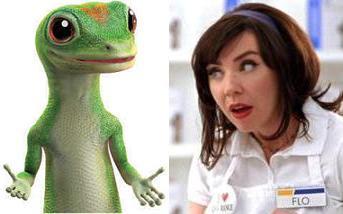 It’s war on the television screen. On one side you have GEICO’s Gecko and the famously maligned Caveman. On the other side is Flo, the hyper enthusiastic Progressive sales clerk. It’s hard to escape these characters during sporting events or prime time as they try to win market share through a combination of amusing brand building characters and claims of lower prices.
It’s war on the television screen. On one side you have GEICO’s Gecko and the famously maligned Caveman. On the other side is Flo, the hyper enthusiastic Progressive sales clerk. It’s hard to escape these characters during sporting events or prime time as they try to win market share through a combination of amusing brand building characters and claims of lower prices.
Which company is gaining the upper hand?
GEICO is a subsidiary of Berkshire Hathaway and investors can monitor the company’s progress through Berkshire’s quarterly financial statements. Progressive is a publicly traded company where one can gain greater insights into financial results through monthly financial releases.
Last year, we presented a ten year comparison between GEICO and Progressive to see if any trends could be identified regarding underwriting results or market share. (Note: Since underwriting results and investment results should be evaluated separately, we focused only on underwriting results.)
From this study, we could see that over the ten year period GEICO generally had a slightly higher growth rate in premiums earned, a higher loss ratio, and a significantly lower expense ratio. This led to the observation that GEICO has been able to gain market share in recent years by offering lower premiums (leading to higher loss ratios) while maintaining higher underwriting profitability over the past few years due to tight controls on expenses, as reflected in the lower expense ratio.
2009 Results
GEICO
Since Berkshire Hathaway’s annual report has not been released yet, we only have GEICO’s results through the first nine months of the year based on Berkshire’s Q3 report. GEICO had $10,103 million in net premiums earned, which is up 9% from the first nine months of 2008. The loss ratio was 77.2 and the expense ratio was 18.3 which results in a combined ratio of 95.5. Pre-tax underwriting profits for the first nine months of 2009 came in at $459 million.
Progressive
Progressive recently published financial results for December which also includes figures for the full year. The company reported $14,012.8 million in net premiums earned, which is up almost 3% from 2008. The loss ratio for the year was 70.7 and the expense ratio was 20.9 for a combined ratio of 91.6. Pre-tax underwriting profits came in at $1,175.6 million for the year.
For comparative purposes, for the first nine months of the year we can examine Progressive’s results for September. The company reported $10,293.4 million in net premiums earned, a loss ratio of 70.5, an expense ratio of 21.1, and a combined ratio of 91.6 for the first nine months of 2009. Pre-tax underwriting profits for the first nine months of 2009 came in at $859.6 million.
GEICO Aims for Market Share
From looking at the data presented above, it would appear that GEICO has made a decision to take a more aggressive stance on pricing which has resulted in increasing market share but at the expense of a higher loss ratio. For the first three quarters of 2009, GEICO nearly matched Progressive in terms of premiums earned and was growing premiums at a much faster rate than Progressive.
The higher loss ratio would suggest that GEICO is competing on price. In addition, GEICO’s expense ratio for the first nine months of 2009 was 18.3 compared to 17.9 for 2008 which could indicate a more aggressive advertising strategy.
While we will not know for certain until Berkshire Hathaway publishes the 2009 annual report next month, it looks likely that GEICO may surpass Progressive in terms of net premiums earned for 2009 if the trends established during the first nine months of the year persisted into the fourth quarter.
The price of gaining this market share is a lower level of profitability compared to Progressive, at least in the short run. However, since insurance is a product that has high switching costs given the hassle involved in changing insurance companies, GEICO may be able to retain the gains in market share even if they become slightly less aggressive on pricing going forward. Generally, consumers are not going to be motivated to change auto insurance companies unless the savings is more than trivial.
Most Effective Ad Campaign?
So who is more effective: Flo or the Gecko? Take our poll and register your opinion.
Disclosure: The author owns shares of Berkshire Hathaway. No position in Progressive.
